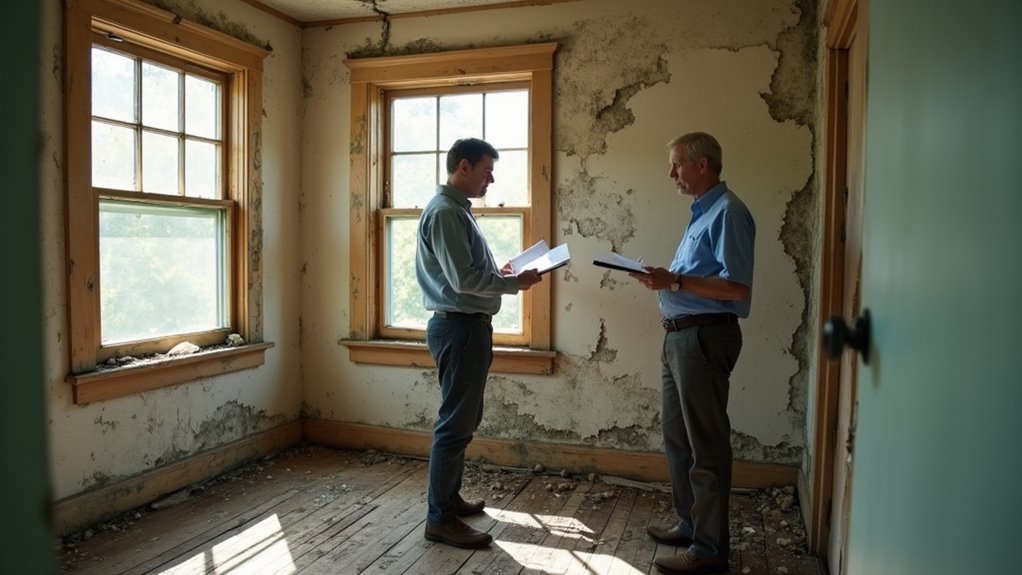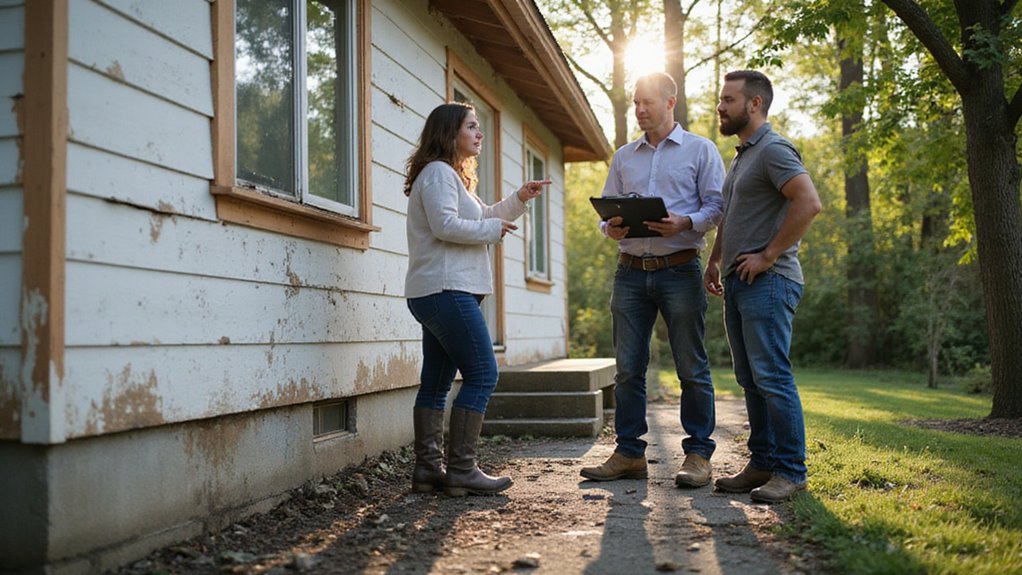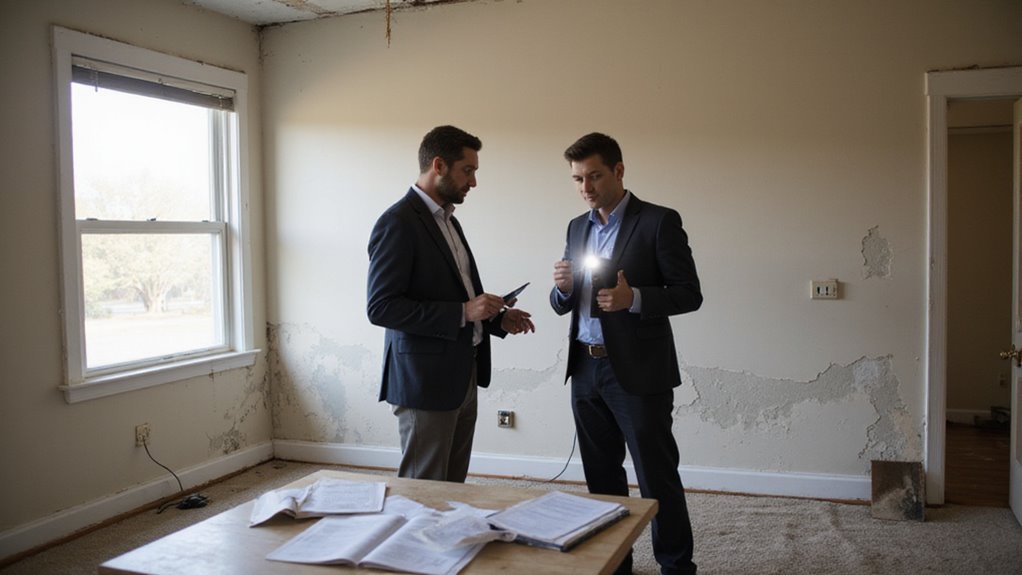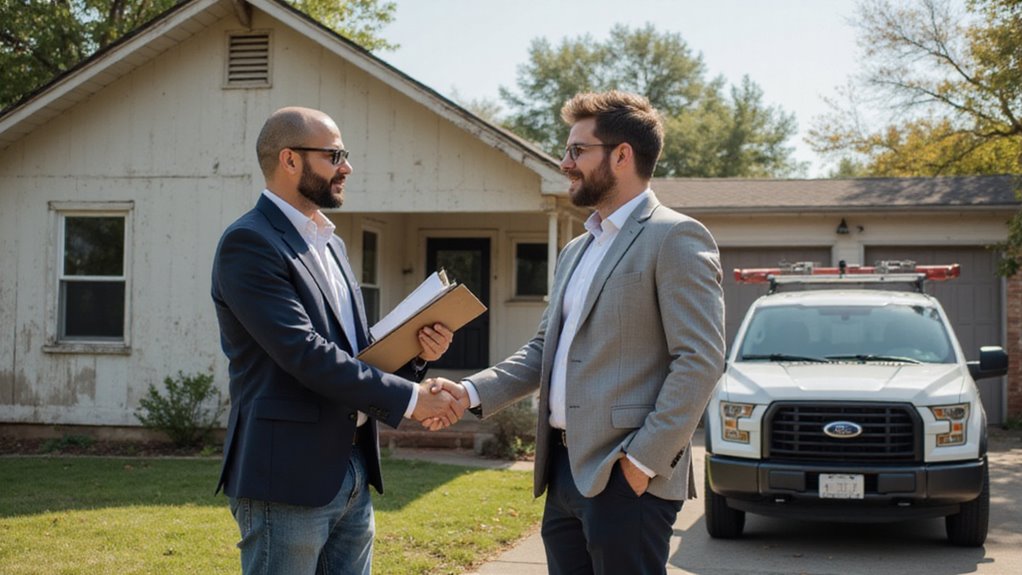Selling a house with mold or water damage can feel overwhelming. Many buyers get scared away by visible problems or possible repair costs. This makes it tough to get good offers or sell quickly.
You might worry that your home will sit on the market for months. Agents may suggest expensive fixes before even listing. Cash buyers might seem impossible to find if your property looks too risky.
But there is hope: You can find cash buyers for a house with mold or water damage by targeting investors who seek fixer-uppers. These buyers often prefer homes needing repairs and can close fast.
This approach helps you sell without costly renovations or long delays. This blog will guide you through simple steps to attract serious cash buyers and sell your damaged house quickly.
Key Takeaways
- Contact local real estate investors and house flippers who specialize in buying homes needing repairs for fast, cash transactions.
- List your property on investor-focused platforms that connect sellers with cash buyers interested in renovation projects.
- Provide transparent disclosures, inspection reports, and repair estimates to build trust and attract serious cash offers.
- Reach out to reputable “We Buy Houses” companies that purchase properties as-is, regardless of mold or water damage.
- Network at real estate investment groups and online classifieds to expand your pool of potential cash buyers.
Understanding the Appeal of Damaged Properties to Cash Buyers

Cash buyers look for damaged properties because they can buy them for less money. These buyers see a chance to make a profit by fixing problems like mold or water damage. If the repairs are done well, they can sell the home for more later.
Most cash buyers have experience with repairs and know how to keep costs low. They also understand the rules for disclosures and building codes. If they follow these rules, they can avoid legal trouble. Because expired or damaged listings are often overlooked by regular buyers, market perception can influence the price offered by cash investors.
Some buyers are not scared by big repairs because they have the right skills and tools. They often move quickly and make offers without waiting for loans. If you want to sell a damaged property fast, cash buyers may be your best option.
When selling a damaged home, it’s also important to have proper documentation ready to show the property’s condition and keep the sales process smooth.
Assessing the Extent of Mold or Water Damage
You’ll need to pinpoint exactly which areas of your property are affected by mold or water damage before taking any next steps. Accurately identifying these spots lets you estimate a realistic repair cost range, which is crucial for both pricing and negotiations. By handling this assessment upfront, you’ll build trust with cash buyers and streamline the selling process.
Involving certified inspectors is especially important, as they can reveal hidden problems behind walls or under floors that might impact both disclosure requirements and negotiation outcomes. Getting a thorough assessment is also a sign of transparent and respectful transactions, which makes your property more attractive to reputable cash buyers in New Market, VA.
Identifying Affected Property Areas
Before marketing a property with mold or water damage, you must identify all affected areas. A thorough inspection helps you find where the damage is. Focus on places where water problems often hide.
Basements, attics, crawl spaces, and bathrooms are key spots to check. Ceilings, walls, and floors near pipes or leaks may also have damage. Look for mold, stains, warped surfaces, and musty smells.
Use a moisture meter to find hidden water. Document each problem you find to keep a clear record. Accurate information builds trust with potential buyers.
If you show buyers exactly where the damage is, you can answer their questions with confidence. This approach helps prevent confusion or disputes later. Clear details make the sales process smoother for everyone.
Estimating Repair Cost Range
Estimating repair costs helps you understand what fixing mold or water damage will actually cost. Accurate estimates are important for insurance claims and selling your property.
Start by asking licensed contractors for written repair quotes. If you get several quotes, you can compare them to find hidden costs. Some repairs may be covered by your insurance, so check your policy.
You should also look at recent appraisals for similar homes in your area. If you do this, you will know if your repair costs are reasonable. This information helps you set a fair price and negotiate with buyers.
Setting a Realistic Asking Price

To set a realistic asking price, start by assessing your property’s condition honestly and without bias. Compare similar homes in your area, but adjust for mold or water damage and the associated repair costs. This approach ensures you attract serious cash buyers while protecting your bottom line.
For homes with code violations or damage, it’s important to analyze comparable homes with violations and subtract estimated repair costs to arrive at a compelling price. Before finalizing your asking price, make sure you are prepared to disclose damage details early, as transparency is both legally required and builds trust with potential cash buyers.
Assessing Property Condition Honestly
Assessing property condition honestly means knowing and sharing all issues, like mold or water damage. This helps set a fair asking price. If you hide problems, buyers may offer less or back out.
A professional inspection should be your first step. Inspectors can find both visible and hidden issues. If you skip this, you risk missing important damage.
You should collect clear evidence of any problems. Take photos and get repair estimates from professionals. If you gather this information, buyers will trust your listing more.
Review all inspection reports carefully. These reports help you understand the true condition of your home. If you find problems early, you can price your property more accurately.
Evaluating Market Comparables
To evaluate market comparables, look at homes similar to yours that have sold recently. Focus on properties with the same size, location, and condition. If your property has mold or water damage, compare it to others with similar issues.
Check public records, recent sales, and online listings to gather data. If you only look at listings, you might miss the real value. Final sale prices show what buyers are actually paying.
Use this information to set a fair and realistic price for your home. If you price your home right, you can attract serious cash buyers. Accurate comparisons help you sell faster, especially in a tough market.
Factoring in Repair Costs
When setting a price for a house with mold or water damage, you must include repair costs. Buyers will check the home’s condition closely. If you are honest about expenses, you can avoid problems later.
A home inspection can show the full extent of the damage. You should get estimates for mold removal and water repairs from licensed contractors. These costs will help you decide on a fair price.
Buyers may also worry about the time and effort repairs will take. Adding a risk buffer can make your price more appealing. If you price the home realistically, you will attract more serious cash buyers.
Preparing Honest and Transparent Disclosures

Buyers need clear facts to feel confident about a property. Honest and transparent disclosures about mold or water damage are important. Sellers should share all known issues right away.
Document any visible mold, past water leaks, or places that may have problems later. Professional property inspections can give buyers an unbiased report. If you use an inspection, it shows you are proactive and trustworthy. Buyers interested in as-is home sales often appreciate a straightforward presentation of the property’s condition.
Include inspection reports, repair estimates, and details of any repairs done. Organized documents help buyers clearly see the property’s condition. These steps can help lower legal risks and make a sale more likely.
Virginia sellers are legally required to disclose known defects such as mold and water damage, so providing accurate and thorough information is essential for both complying with state laws and fostering buyer trust.
Reaching Out to Local Real Estate Investors
Reaching out to local real estate investors is often the fastest way to sell a house with mold or water damage. These investors look for homes that need repairs and are used to handling renovation risks. They can make quick offers and usually do not need traditional appraisals. If you want to attract serious investors, share clear details about the damage. Include recent repair estimates or contractor quotes if you have them.
Investors appreciate knowing about timelines and local market conditions. Being honest about the home’s condition can make negotiations simpler. Local investors value sellers who are transparent and realistic. If you are upfront, you may get a better offer and a faster sale. Many local investors also offer fair cash offers within 24 hours, helping homeowners move forward quickly without worrying about renovations or costly delays. Sellers are also attracted to no hidden costs or commissions, making this route especially appealing if you want a smooth, fast transaction.
Connecting With Professional House Flippers

Professional house flippers can help you sell a house with mold or water damage. They look for homes with problems and know how to fix them. If you want a quick sale, house flippers are often a good option.
Sellers should start by finding local flippers with good reviews. These buyers will usually inspect the home to see how much work is needed. Inspection results affect how much they offer for the house. Working with a flipper often means the sale closes in days, eliminating the usual waiting period caused by bank approvals.
Honesty about any damage builds trust with flippers. Providing inspection reports can make the process move faster. If you agree on a price, flippers often pay cash and close quickly.
If you want to avoid repairs, selling to a house flipper is a smart choice. This can save time and reduce stress. Flippers take on the repairs, so you do not have to.
Many flippers also monitor local market trends to ensure they make competitive offers that help you sell your home fast.
Listing Your Property on Investor-Focused Platforms
To reach serious cash buyers, you need to list your property on investor-focused real estate sites that attract renovation-minded purchasers. Craft a listing that addresses investor priorities, emphasizing the potential and transparency of an as-is sale. By highlighting these factors, you’ll position your property as a valuable opportunity rather than a problem.
When listing your property, make sure to note any existing liens and clarify that you are working toward clear title transfer, as buyers who understand legal encumbrances can streamline negotiations and speed up closing. Don’t forget to openly disclose property condition and health hazards in your listing, as transparency helps protect you from future legal disputes and ensures qualified buyers know exactly what to expect.
Choosing Targeted Real Estate Sites
Targeted real estate sites are best for attracting cash buyers for homes with mold or water damage. These platforms connect you with investors who understand distressed properties. If you want quick, serious offers, choose sites focused on investment properties.
You should check each site’s audience and reviews before listing. Some platforms offer tools to compare neighborhoods or provide staging advice for as-is homes. If these features match your needs, that site could be a good choice.
If you want investor interest, use sites that target cash buyers and house flippers. Top sites let buyers search by location, property condition, or investment value. Good platforms also give helpful data about local neighborhoods.
Crafting Investor-Friendly Listings
To attract experienced investors, provide clear and honest details about the property. Share recent inspection reports and highlight any problems. This builds trust and lets investors make quick decisions.
Include photos of any damage, such as mold or water issues. If you show the extent of repairs needed, investors can estimate costs. Always mention possible repair timelines.
Use short, direct sentences to explain facts, not feelings. List actual numbers, like recent rent, taxes, or repair bids. If your listing is on an investor platform, avoid emotional language and focus on data.
Curb appeal still matters, even for distressed homes. Simple landscaping or removing debris shows basic upkeep. If the outside looks better, the property’s value may increase.
If you follow these tips, you will attract serious cash buyers. They want fast facts and clear information. Investors value listings that help them assess potential returns quickly.
Highlighting As-Is Sale Benefits
Selling a house as-is offers several benefits. Buyers know the property’s condition upfront, which can make the process smoother. If you use investor platforms, you reach people who expect to handle repairs.
Investors want homes where they can add value themselves. They understand issues like mold, water damage, or insurance claims. If you highlight the as-is sale, you attract buyers who prefer simple deals.
You do not need to spend money on repairs before selling. The sale can close faster because investors are ready for such properties. Negotiations are easier since buyers accept the current condition.
Utilizing “We Buy Houses” Companies
“We Buy Houses” companies can help you sell a home with mold or water damage quickly. They buy properties in any condition and offer cash payments. This process is faster than selling on the open market.
These companies will inspect your home as it is and calculate repair costs. You do not need to fix anything before selling. If you need money fast or want a simple sale, this option may suit you.
Sellers must always disclose all known damage to avoid problems later. Each company may use different contracts, so read everything carefully. If unsure, you should consult a real estate lawyer to protect your rights.
Additionally, by choosing a company that specializes in purchasing homes as-is, you can save time, avoid costly repairs, and benefit from a straightforward process with no hidden fees.
Networking at Real Estate Investment Groups

Networking at Real Estate Investment Groups means meeting other people interested in real estate. Investors, agents, and lenders often attend these meetings. You can learn from others and find business opportunities.
If you join these groups, you may hear about deals before others do. Some members share advice or recommend useful contacts. You can also build trust by attending regularly.
If you want to grow in real estate, networking is important. Many successful investors started by joining these groups. You might find partners or mentors through these connections.
Leveraging Social Media and Online Classifieds
Social media and online classifieds help you reach many cash buyers fast. You can post your property on Facebook Marketplace, Craigslist, and real estate groups. These platforms give your listing more exposure.
Each listing should describe any mold or water damage honestly. Good home staging can help buyers see the home’s potential, even if there are problems. High-quality photos should show both strengths and any flaws.
Quick responses to questions build trust with buyers. Joining real estate forums connects you with investors who want properties like yours. If you combine clear photos, honest details, and fast replies, you may sell your home quickly.
Working With Real Estate Agents Specializing in Distressed Homes
Working with real estate agents who focus on distressed homes can make selling easier. These agents know buyers looking for homes with mold or water damage. They can connect you with investors interested in fixing up properties.
Agents have lists of cash buyers who want distressed properties. They guide you on pricing, needed repairs, and legal disclosures. If you need help with negotiations, these agents handle offers from buyers familiar with complex deals.
Choosing an agent with this experience could lead to a faster and smoother sale. You might also get better offers from serious buyers. If you want less stress, consider working with a specialist in distressed homes.
Marketing to Out-of-State Investors
Out-of-state investors often look for distressed properties in new markets. These buyers are interested in homes with issues like mold or water damage. If you want to attract them, you should provide clear information and honest details about the property.
A full property inspection report helps set expectations and builds trust. Virtual tours allow investors to view the home from anywhere. If you include detailed disclosures, you address legal matters early and avoid surprises.
Online ads can help you reach investors who are looking for these opportunities. Networking in investor forums connects you directly with interested buyers. If you follow these steps, you can market your property effectively to out-of-state investors.
Hosting Investor-Focused Open Houses
When you host investor-focused open houses, you attract buyers who see powerful potential where others see problems. Highlight value-add opportunities, such as renovation or resale, to spark investor interest and competition. Connect with local wholesalers at these events to expand your network and create more selling options.
Attracting Targeted Investor Groups
Targeted investor groups are best to approach when selling homes with mold or water damage. Traditional buyers often avoid these homes due to repair concerns. Investors are more willing to buy if they see renovation potential.
Sellers should highlight the home’s value to investors. Sharing before-and-after photos from similar properties can show the possible improvements. If buyers see clear potential, they may act quickly.
Providing honest property history helps build trust with investors. Sellers should include any past repairs or insurance claims. Inspection reports and repair estimates make the investment decision easier.
If you host open houses, focus on investors and their needs. Show how the property can be improved. Investors are more likely to buy if they understand the opportunity.
Highlighting Value-Add Opportunities
Investors want to see clear ways a property with mold or water damage can increase in value. You should show how repairs can lead to strong returns. If you highlight these value-add opportunities, buyers will see the property’s potential.
Host open houses just for investors and share a full water damage report. Give cost estimates for all necessary repairs. If possible, show the expected after-repair value to prove future profit.
Contractor quotes and reputable mold solutions build trust. Walk investors through the property and point out areas for improvement. Use before-and-after examples to show how changes can boost rental or resale income.
Detailed documentation and a repair plan help investors picture the finished product. If you do this, buyers can see how a troubled property becomes a strong investment. This approach makes your property more appealing to cash buyers looking for opportunities.
Networking With Local Wholesalers
Networking with local wholesalers helps you reach more potential buyers for your property. Wholesalers know cash buyers who want homes with mold or water damage. Their connections increase your chance of getting serious offers.
If you host an investor-focused open house, show accurate property values and explain legal issues clearly. Sellers should always be honest about all damage and repair costs. This helps buyers make informed choices.
Show repair estimates and the After Repair Value (ARV) to highlight possible profit. Invite wholesalers to bring their investor contacts to the open house. Provide documents about legal rules, disclosures, and any required repairs. This method can help you sell your property faster.
Screening Potential Cash Buyers for Reliability
To check if a cash buyer is reliable, always confirm they are real and can finish the purchase. Ask for proof of funds and look at their past property deals. Reliable buyers usually give references and share details of recent purchases.
Compare their offer with your property’s value to see if it is fair. If a buyer is serious, they will answer questions about their timeline and experience with damaged homes. You should also ask if they plan to fix or resell the house.
If you follow these steps, you lower the risk of wasted time or failed sales. Careful checks help make your sale smoother and more successful.
Conclusion
If you need to sell a house with mold or water damage, you have options. If you disclose the damage and set a fair price, you can attract serious buyers. Many investors look for homes with potential, even if they need repairs.
If you want a fast and hassle-free sale, selling to a cash buyer is a smart choice. Cash buyers can move quickly and often buy homes as-is. If you work with a reputable company, the process can be simple and stress-free.
If you are ready to sell, we buy houses for cash at Align Real Estate Solutions. We offer fair prices for homes in any condition. Contact us today to see how we can help you sell your property quickly.
Author
-

Zach Koops is co-founder and Real Estate Success Manager at Align Real Estate Solutions, serving homeowners across Virginia since 2024. With a passion for real estate and a heart for people, Zach has built his career around helping sellers navigate tough situations—foreclosure, inheritance, relocation, repair-overload—with clarity and compassion. He’s known for being straightforward, steady under pressure, and deeply invested in relationships. Outside of work, he spends his time as a husband and father, enjoys the outdoors in Shenandoah Valley, loves singing on stage, and constantly seeks growth through reading and new experiences.









